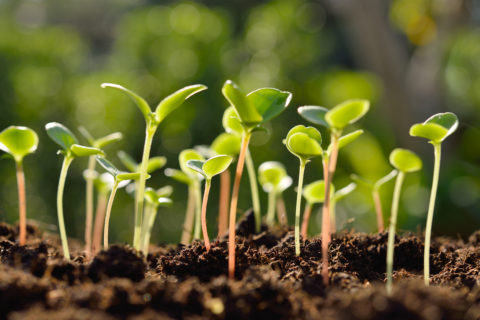
When choosing seeds and plants, use local or regional sources to find plants that will thrive in your garden.
Are you thinking about adding new plants to your yard? Are you planning this year’s vegetable garden?
You will have the best results if you use regional or local sources and choose varieties that will grow well in our Northwest climate.
For plants, it is best to seek out a local nursery rather than a big box store. Local nurseries sell starts and plants that have been tended carefully to grow strong roots and stems. And they have knowledgeable staff who can help you choose plants that will do well in your yard.
Many plants from the box stores have been grown with lots of fertilizer for rapid growth. They may be less expensive, but they may struggle when you place them in your landscape. If you need to replace them because they grow poorly or don’t survive, it will cost you more money in the long run.
Consider the following when choosing seeds and plants:
What are typical local temperature patterns and rainfall? One useful piece of information is the USDA Hardiness Zone, which is based on the average annual lowest winter temperature in a location. The Seattle area is Hardiness Zone 8b, which is hardy down to 15 to 20 degrees. However, some recent winters have had more extreme weather, so use the zone map with a grain of salt.
What is your own site’s microclimate? Are you on a ridge with more wind than other locations? Will the plant be in a sheltered spot with less exposure to wind? How much sunlight will the plant get in summer and in winter?
Are you choosing the right plant for the space? How much room will it have to grow? When will it crowd nearby plants?
What is your soil like? Is it mostly clay or mostly sand? What is the pH? How many nutrients and how much organic matter is present? It’s a good idea to have your soil tested. King Conservation District offers a soil testing service.
What insects and diseases are typical where you live? Have you had problems with certain pests in the past? If so, choose plants that are less susceptible.
Online sources
If you would like to buy online, here are some mail order sources for organic seeds and plants that will grow well in our maritime Northwest climate.
Seattle Seed Company sells organic, heirloom and non-GMO seeds and seed supplies: vegetables, herbs, flowers and microgreens. The website includes a month-by-month planting calendar. There is also a company store at 151 12th Ave in Seattle.
Raintree Nursery sells flavorful, disease resistant fruit varieties from its garden center in Morton, WA. This includes berries, fruit and nut trees, vines, edible ground covers, unusual edibles and more. Order or download a free catalog here.
Territorial Seed Company is a family-owned business in Oregon. It sells a wide variety of vegetables, fruits and flowers, both seeds and plants. All of the seed varieties are tested at their research garden. Request or download a free catalog here.
Seeds of Change sells 100% certified organic, flower, herb and vegetable seeds. The website says organic growing allows you to “Grow food you know is safe, save money on food bills and enjoy better tasting food.” Request a copy of their catalog here.
Renee’s Garden Seeds sells heirloom and gourmet vegetable, flower and herb seeds. They source their seeds from sustainable and organic growers.
Most of these companies also sell garden tools, supplies, books and more.

Trackbacks/Pingbacks